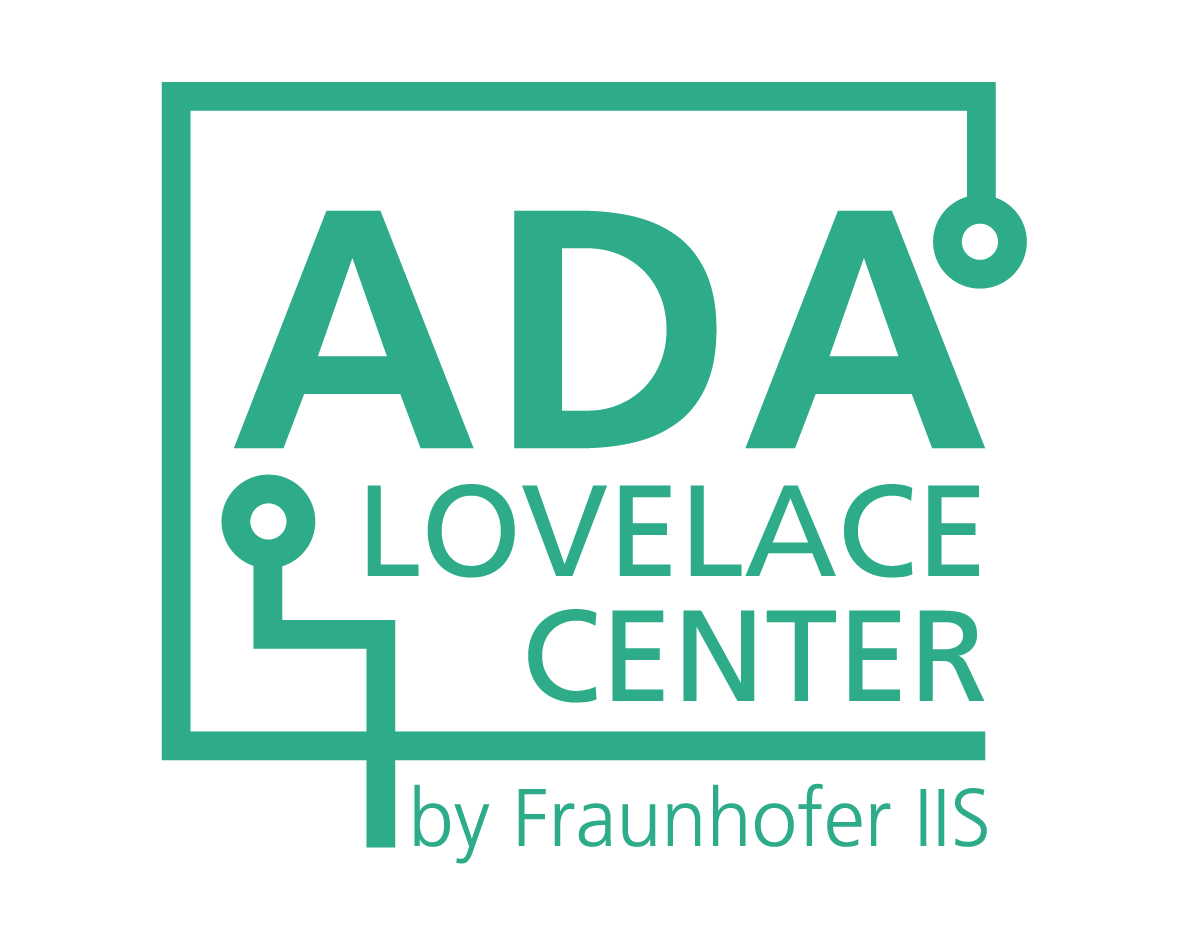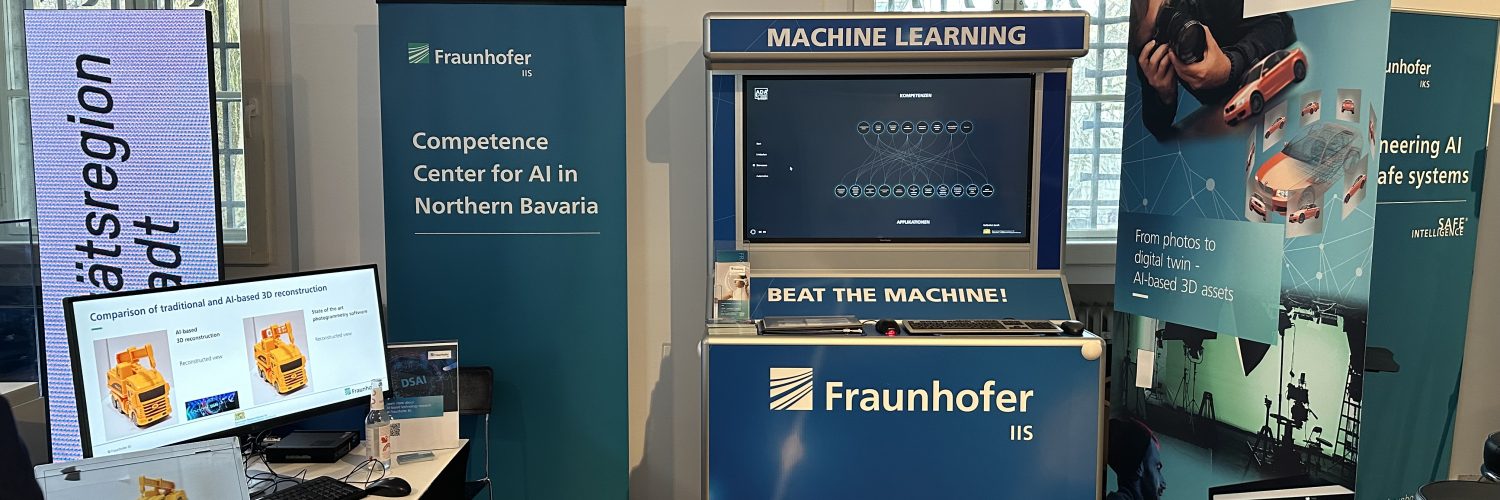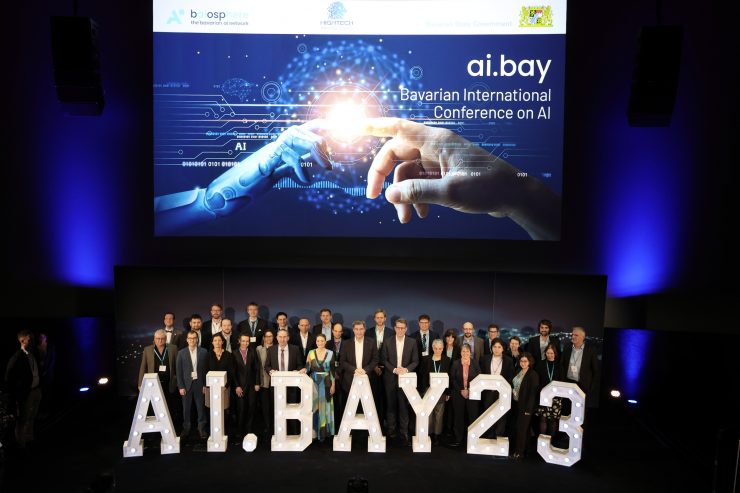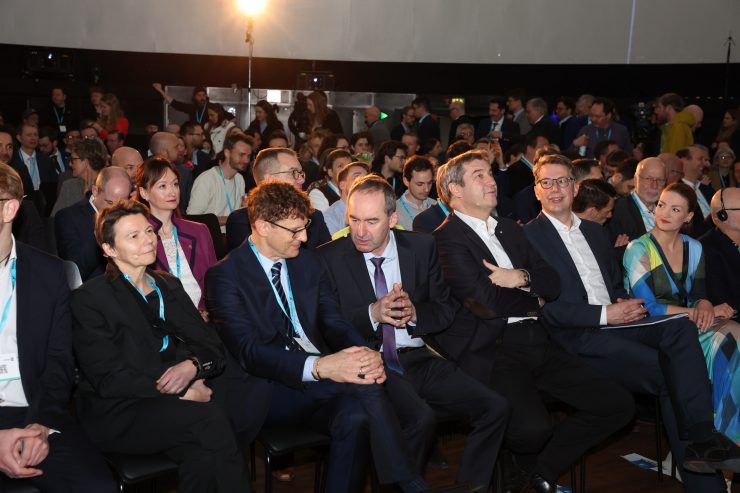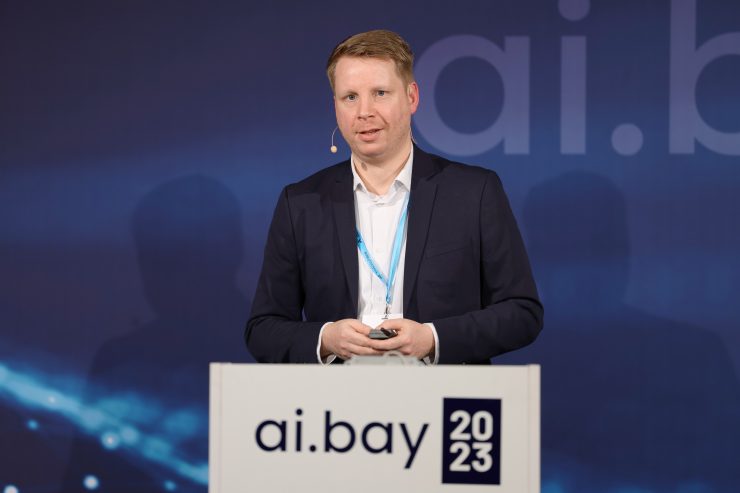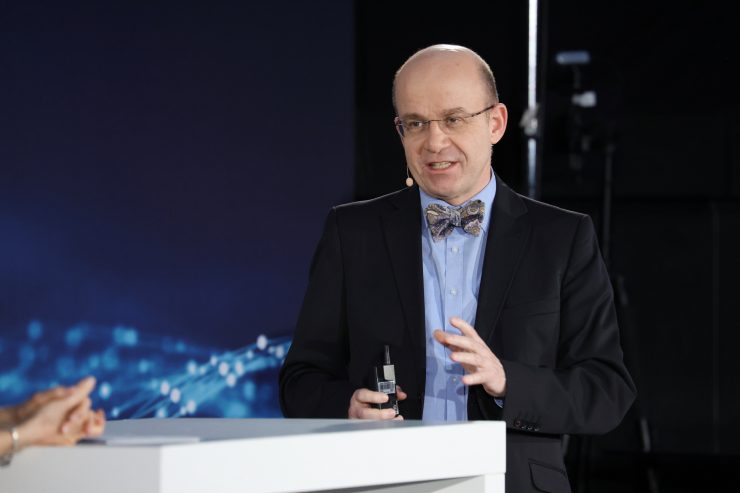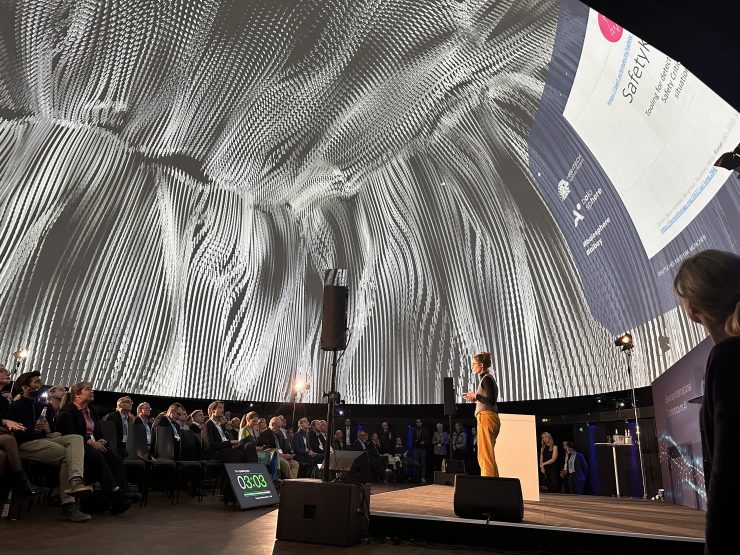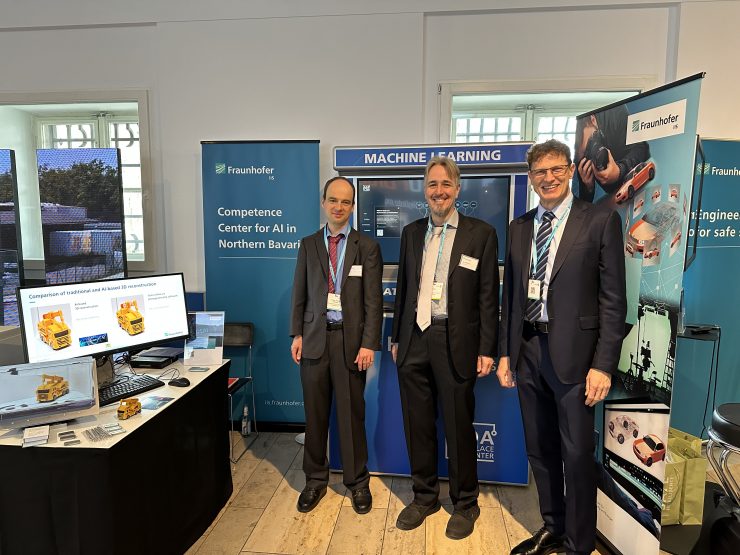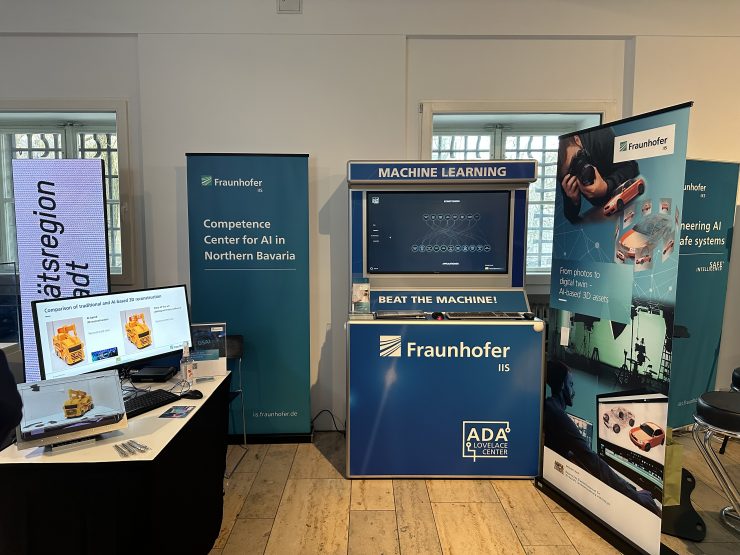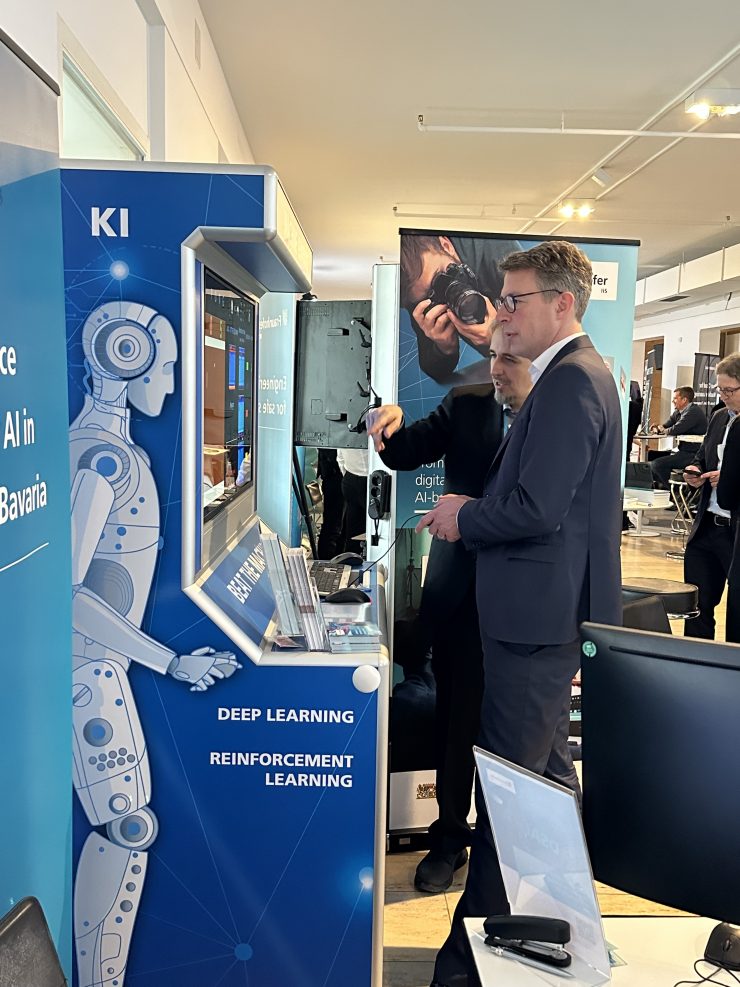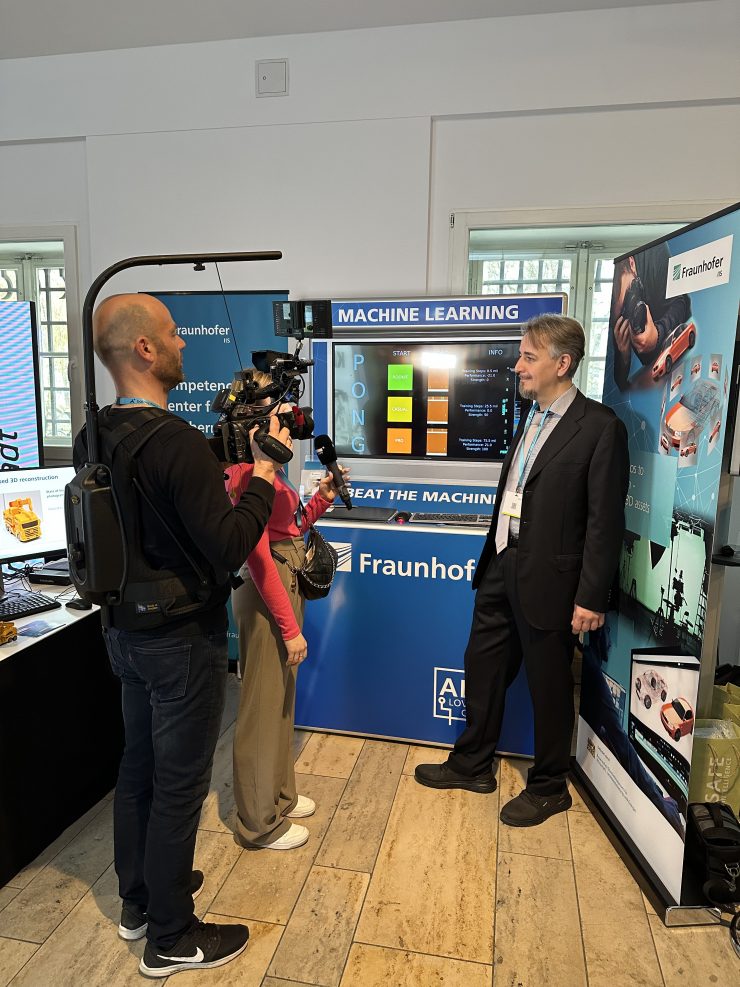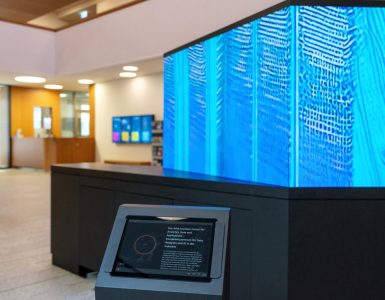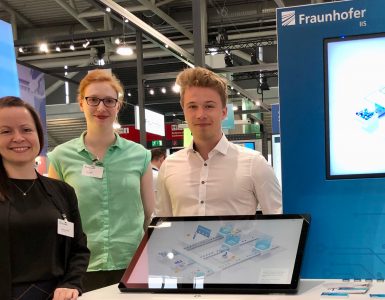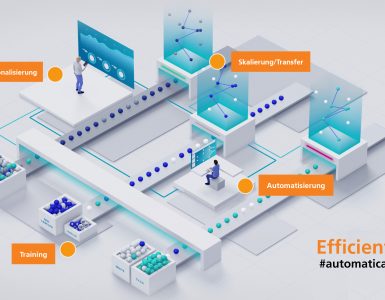Auf der ersten internationalen Konferenz für KI stellt sich natürlich auch das ADA Lovelace Center vor.
Am 23. und 24. Februar fand die »ai.bay 2023«, der erste internationale Kongress für Künstliche Intelligenz in Bayern statt und lockte mehr als 1000 Gäste aus 22 Ländern an, denen über zwei Tage hinweg ein spannendes Programm zum Thema »Künstliche Intelligenz« geliefert wurde. Das war sicher ein sehr eindrucksvolles Event und auch wenn ich, Ada, natürlich nicht persönlich dabei war, waren Forschende des ADA Lovelace Center vor Ort und haben das Projekt unter anderem mit einem spielerischen Demonstrator präsentiert. Einer von ihnen ist Dr. Ing. Axel Plinge, Applikationsleiter »KI-Framework für autonome Systeme« im ADA Lovelace Center, der Ihnen und mir nun einige Fragen rund um das Event beantwortet.
Was war deine Aufgabe bei der AI.BAY?
Die Vorstellung des ADA Lovelace Center und des PONG-Demonstrators. Letzterer zeigt Reinforcement Learning anschaulich anhand des alten Computerspieles, das viele kennen. Die Besucher können gegen einen KI-Agenten antreten, der kurz, lang oder sehr lang gegen einen Computerspieler das Spielen gelernt hat. Interessanterweise ist der am längsten trainierte wieder leichter zu schlagen, da er sich zu sehr auf den Computerspieler eingestellt hat. Das veranschaulicht das sogenannte »overfitting« in der KI und zeigt auch, dass zur Anwendung von KI eben auch Expertenwissen benötigt wird.
Reinforcement Learning ist also dein Schwerpunkt oder mit welchem Thema des Projektes warst du da?
Ich habe die Arbeit meiner Gruppe im ADA Lovelace Center vorgestellt, also die Applikation »KI für Autonome Systeme«. Hier wird Reinforcement Learning eingesetzt, also eine KI die aus Erfahrung ein Verhalten lernt. Das kann nicht nur das Spiel PONG sein, sondern auch ein Fahrassistent für schwierige Manöver im Auto oder Assistenz für Ingenieure bei der Planung und Steuerung von z.B. Chemischen Produktionsanalagen. Wesentlich ist hier natürlich auch, dass die KI verlässlich und nachvollziehbar agiert, damit sie vom Markt und Endanwender auch akzeptiert wird. Wir nennen das »Dependable AI«.
Welche Frage wurde dir am häufigsten gestellt und wie war deine Antwort?
Die Frage war: »Glauben Sie, dass KI wirklich eine Vorteil für die Bayerische Wirtschaft bringt?«
Und meine Antwort ist ganz klar: Ja, wenn man Sie richtig einsetzt, denn KI kann an vielen Stellen den Menschen bei der Arbeit unterstützen und somit Fachkräfte wie z.B. Ingenieure entlasten. Damit werden diese nicht komplett ersetzt, da sie weiterhin in der Anwendung aber auch zusammen mit unseren KI-Experten beim Training der KI und kontinuierlichen Entwicklung gebraucht werden.
Wie lange warst du bei der Konferenz und hast du auch etwas vom Programm mitbekommen?
Ich war zwei Tage vor Ort. Am ersten Tag am ADA Lovelace Center-Stand, am zweiten Tag konnte ich mir sehr spannende Vorträge anhören. Darunter z.B. Mirko Kovac, der in seinem Vortrag zur nachhaltigen Robotik nicht nur gezeigt hat, wie man energieeffiziente Flugroboter zur Waldbeobachtung realisiert, sondern auch Drohnen, die autark fliegend dreidimensionale Gebäude bauen oder sich vom Flugzeug zum Segelboot bei der Landung auf dem Wasser umkonfigurieren.
Max Welling hat einen sehr visionären Vortrag gehalten, in dem er erklärt wie man dank KI und gesteigerter Rechenleistung weniger Daten aus Laborversuchen zur Forschung und Entwicklung braucht bis hin zum rein computerbasierten »in-silico« Design von Geräten und sogar Molekülen für die Werkstoffe der Zukunft.
Was war dein Highlight bei der Konferenz?
Nun ja, natürlich werde ich nicht vergessen, dass ich Fernsehreportern von n-tv und Markus Blume, dem Minister für Wissenschaft und Kunst sowie Hubert Aiwanger, dem stellv. Ministerpräsident von Bayern den PONG-Demonstrator erklärt habe. Aber als KI-Forscher fand ich den Vortrag von Max Welling sehr cool und es hat mich sehr gefreut, dass er dann noch zum Spielen am PONG bei mir vorbeigekommen ist.
At the first international conference for AI, the ADA Lovelace Center of course also presents itself.
On February 23 and 24, „ai.bay 2023“, the first international conference for artificial intelligence, took place in Bavaria and attracted more than 1000 guests from 22 countries, who were offered an exciting program on the topic of „artificial intelligence“ over two days.
This was certainly a very impressive event and even though I, Ada, was of course not there in person, researchers from the ADA Lovelace Center were on site and presented the project with a playful demonstrator, among other things. One of them is Dr. Ing. Axel Plinge, application manager „AI Framework for Autonomous Systems“ at the ADA Lovelace Center, who now answers some questions about the event for you and me.
What was your task at the AI.BAY?
The presentation of the ADA Lovelace Center and the PONG demonstrator. The demonstrator shows reinforcement learning vividly using the old computer game that many are familiar with. Visitors can compete against an AI agent that has learned to play for a short, long, or very long time against a computer player. Interestingly, the agent trained the longest is again more easily beaten by a computer player because it has become too attuned to it. This illustrates what is called „overfitting“ in AI and also shows that expert knowledge is needed just to use AI.
So reinforcement learning is your focus or what topic of the project were you there to present?
I presented the work of my group at the ADA Lovelace Center, i.e. the application „AI for Autonomous Systems“. Reinforcement learning is used here, so an AI that learns a behavior from experience. This can be not only the game PONG, but also a driving assistant for difficult maneuvers in the car or assistance for engineers in the planning and control of e.g. chemical production plants. Of course, it is also essential that the AI acts reliably and comprehensibly so that it is accepted by the market and the end user. We call this „Dependable AI“.
What question were you asked most often and what was your answer?
The question was, „Do you think AI will really bring an advantage to the Bavarian economy?“
And my answer is quite clear: Yes, if you use it correctly, because AI can support humans in their work in many places and minimize the work required of specialists such as engineers. This does not replace them, because they will still be needed in applications and together with our AI experts in training AI and continuous development as well.
How long were you at the conference and did you get anything out of the program as well?
I was on site for two days. On the first day at the ADA Lovelace Center booth, and on the second day I was able to listen to very exciting presentations. For example, Mirko Kovac, who showed in his presentation on sustainable robotics how to realize energy-efficient flying robots for forest monitoring, and furthermore also drones that build three-dimensional buildings flying autonomously or reconfigure themselves from an airplane to a sailboat when landing on the water.
Max Welling gave a very visionary talk explaining how, thanks to AI and increased computing power, we need less data from lab experiments for research and development, all the way to purely computer-based „in-silico“ design of devices and even molecules for the materials of the future.
What was your highlight at the conference?
Well, of course I won’t forget explaining the PONG demonstrator to TV reporters from n-tv and Markus Blume, the Minister of Science and Art, and Hubert Aiwanger, the Deputy Minister President of Bavaria. But as an AI researcher, I really liked Max Welling’s presentation and I was very pleased that he came by to play with the PONG.

